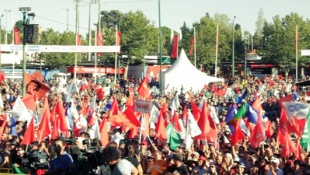The European Counterrevolution freed the imperialist powers of the need for sticking together in order to prevent the spread of socialism. This need was recognized by US planners as early as the final years of World War II, and its immediate outcome was the creation of NATO in 1949. This step was soon followed by the setup of a whole chain of US alliances designed to contain socialism and especially the Soviet Union. Nevertheless, the main battlefield of this confrontation, termed the Cold War, remained Europe.
The US implemented the Marshall Plan in order to invigorate and bind together the economies of Western Europe. The effect of the plan was a significant growth in the volume and speed of trade not so much between Western Europe and the US as between the individual countries of Western Europe, which was in the space of a few decades developed into a powerful and integrated economic region fit for competition with the emerging socialism of Eastern Europe.
The lubricant used for making the wheels of trade and production in this new region run smoothly was the dollar. The dollar became the universally accepted business and reserve currency of the postwar capitalist world.
This was a design much to the advantage of the US itself. It made it possible, indeed necessary, for the US to maintain a permanent deficit of payments in relation to the rest of the world during the entire postwar period, thus providing the American economy with resources for consumption, investment, and military expenditure considerably in excess of the superpower´s own economic capacities. For half a century or more, the USA became a parasite feeding on the whole world.
The economic integration of Western Europe led to a political integration, starting with the French-German entente and culminating in the creation of the European Union. No doubt, to begin with this development was encouraged by the US: It helped create the alternative to European socialism wanted by American strategy planners in order to contain the influence of the Soviet Union. And this scheme worked as we all know. The socialist countries of Eastern Europe were lured away from their own project of regional economic integration, entering individually into trades agreements with the integrated Western European region, at that time still only a European Economic Community. Their economies were more and more directed towards the West, governed by export possibilities and market demands, and they became dependent on the West in much the same way as that in which the newly freed colonies entered into a neocolonial relationship with the old imperial metropoles: Rather than building up a healthy regional integration of their own, they became appendages to the global imperialist economy. This economic subordination entrained a subordination in the superstructural spheres: People came to accept the norms of the capitalist West and look to the West, especially the countries of the European Community, as the abode of affluence, freedom and normalcy, and the working class lost its ideological hegemony.
This development made the European Counterrevolution inevitable, and what happened afterwards confirmed the decisive role of the relations just outlined: As the Eastern European countries broke their ties to the Soviet Union and aligned themselves openly with the West, there was much talk of freedom and independence, but the reality was quite the opposite they all gave up their independence and joined the European Union as fast as possible, generally on terms which reduced them to second-class members.
But in the meantime another thing had happened, caused by the same chain of events. The integrated and economically as well as politically greatly strengthened Western Europe, expanding into the East and aspiring to statelihood, began to be felt by US planners as a threat to US hegemony, occupying much the same place in US strategic planning as the Soviet Union had done: Not an actual threat, but a rising potential rival that might attempt to question the leading role of the US, the prevention of which is the foremost goal of American foreign policy according to Pentagon's Defence Planning Guidance from 1992. I have talked about this before, so I am only going to recapitulate briefly: This new rivalry between the EU core and the US became visible for the first time during the wars in Yugoslavia in the 90's, as America and the European powers vied for footholds in the Balkans, and it reached a peak in the opposition of France and Germany, along with Russia and other countries, to the US war on Iraq. It is visible in the stances towards the so-called Iran nuclear crisis, where Europe once again seems to align more with Russia than with the USA. And US officials and planners now warn openly against too much independence on the side of the EU, especially in military build-up.
Recently, I read a statement, I think it was by our Tudeh comrades, which put these differences with regard to Iran and Iraq in a much deeper perspective. As I recall it, the wording was that France had installed ayatollah Khomeiny in Iran, thereby securing control of the Iranian revolution. This makes very much sense in the context of developments in the Middle East region at the time. The Shah had been a US puppet, and the revolution very much weakened Washington's position in the region. The response of the USA was to stake on Saddam Hussein and instigate the Iraq-Iran war of the 80's. So, was this a proxy war between the US and an emerging imperial Europe, the first sign of a serious rivalry? If you dare not hit the master, you can always hit the dog, or let your own dog bite it.
If that is so, the positions changed towards the end of the 80's, perhaps because Saddam did not deliver, did not succeed in toppling the ayatollah regime. But the most important crime of Saddam, the one that probably was the decisive factor leading to the invasion, was that Iraq had started replacing the dollar as main business and reserve currency with the euro. This was a bomb under US world supremacy, indeed under the American economy and ultimately the very existence of the superpower. If this were to spread to the rest of the world, the USA would have to equalize its balance of payments and rely on its own resources, as most countries do; consumption and investment would drop, a national economic crisis would ensue, and the possibilities for military intervention abroad would be diminished. As a significant part of US business relies on military expenditure, this would further deepen the crisis. This kind of insubordination could not be tolerated, and war was the answer a war that was opposed by the EU core countries, because they had other stakes in the matter.
Recent reports indicate that although Iraq was forced to return to the dollar system, the US dollar is continuing to loose weight in the international exchange system, and soon the dollar may in fact be deprived of its dominating position in the global economy. This is discussed openly by economists of the world, and the US government knows. Furthermore, the US disposes of no other means to put off the crisis than war: The world must be shown that the USA is still in control and that rebel countries may be forced to remain loyal to the dollar, as was Iraq.
So, these are the dangers, but also the potentialities of the international situation today: A more and more desperate and unpredictable American superpower on a constant look-out for new enemies, new war projects in order to prop up its tottering empire, but increasingly meeting with resistance all over the world; and an emerging imperial Europe eager to supplant its former master and regain the position it enjoyed in the world a century ago, but likewise meeting with growing resistance, not abroad, but at home resistance to further build-up of a centralized European Union state, as shown very clearly by the French and Dutch rejection of the proposed Constitution Treaty.
The dangers: Two global imperialist entities once again moving towards conflict based on conflicting interests and increasingly prone to adventurism after the defeat of the common enemy. In the resistance to this adventurism, internally and externally, lie the potentialities the hope for the future.
Henrik Stamer Hedin

